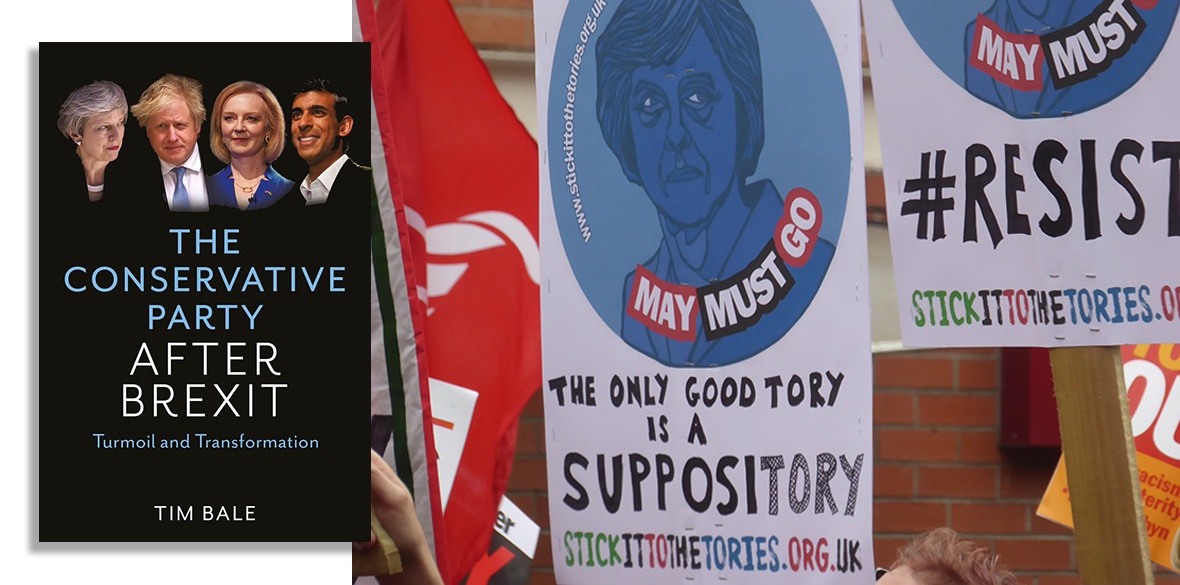This is the last article you can read this month
You can read more article this month
You can read more articles this month
Sorry your limit is up for this month
Reset on:
Please help support the Morning Star by subscribing here
The Conservative Party after Brexit: turmoil and transformation
by Tim Bale, Polity Press, £25.00
THIS is a thrilling, fascinating and revealing account of one of the wildest rides in British history. Tim Bale, professor of politics at Queen Mary University of London, is an excellent political historian and analyst.
Brexit got rid of one Conservative prime minister at once — David Cameron — then another, punishingly slowly — Theresa May.
Bale has three brilliant chapters on May’s premiership — her brief pomp, the nemesis swiftly following, and then “a bad hand played badly.”
May had wept when she’d realised Leave had won the 2016 referendum. When she stood in the subsequent Conservative leadership election, she was clearly the pro-EU candidate. Three-quarters of her support came from MPs who had backed Remain. She chose a Cabinet most of whom had backed Remain.
But when the country needed to be united after the bitter campaigning, she sharpened the divisions. At the October Conservative Party conference she attacked those who had voted Remain: “If you believe you’re a citizen of the world, you’re a citizen of nowhere. You don’t understand what the very word ‘citizenship’ means.” This wrongly implied that all who voted Remain believed that they were citizens of the world, implied that they were not British citizens, and gratuitously insulted their intelligence.
She then compounded her folly by telling Leave voters that some found: “Your patriotism distasteful, your concerns about immigration parochial, your views about crime illiberal, your attachment to your job security inconvenient.” This assumed that all Leave voters thought the same about all these issues, implied that these were the only issues that counted for Leave voters, and assumed that they all had generally illiberal views. She endorsed the worst prejudices against those who voted Leave.
After her disastrous negotiations with the EU, and her many other failings (especially her response to the Grenfell disaster) she became unelectable. So, with ruthless despatch, the party ditched her and elected Johnson as leader.
And in 2019, he led them to victory in the “get Brexit done” election. Bale comments: “The Tories’ decision to ditch May in favour of Johnson was, electorally speaking anyway, by far the most effective switch of leaders ever made by a British political party.”
He observes: “The bulk of those voters who had ‘defected’ to the Tories in 2019 had done so because they believed Johnson would get Brexit done and because they were distinctly unimpressed by Jeremy Corbyn and what they saw as the excessive social liberalism and lack of patriotism of his Labour Party, not because they had somehow been converted to Thatcherite Conservatism.”
They were not “moving right” or embracing Thatcherism. They were voting for a party that was now saying that it would really do what Cameron’s Conservative government had promised on April 16 2016: “The government will implement what you decide.”
As Bale tells the story in successive chapters, after this electoral triumph, “Boris rampant” swiftly led to “pandemonium” as “things fell apart.” And with Covid, the lockdown controversies, Dominic Cummings’s Barnard Castle visit, Partygate, and continuing policy fiascos, it did indeed seem that mere anarchy had been loosed upon the UK.
It quickly became clear that, as Bale puts it, Johnson was: “A one-man moral minefield with no discernible interest in the business of governing” whose premiership was one of “sheer dysfunction and dishonesty”, and which unravelled in more chaos.
Then followed yet another leadership election, and yet another fiasco. Conservative Party members chose Liz Truss over Rishi Sunak, by 57 per cent to 43 per cent. This time, hubris begat nemesis in just 44 days. And so we now have a new Prime Minister, whose own party members had rejected him as party leader just six weeks before!
The book does read, as ex-home secretary Amber Rudd noted, like a horror story, and Bale tells it brilliantly well.
The last section of his last chapter is headed “Turn-around and transformation?” The book’s subtitle is “turmoil and transformation,” without the question mark.
We can all see that there has been plenty of turmoil, but some of us might well be asking what transformation?









